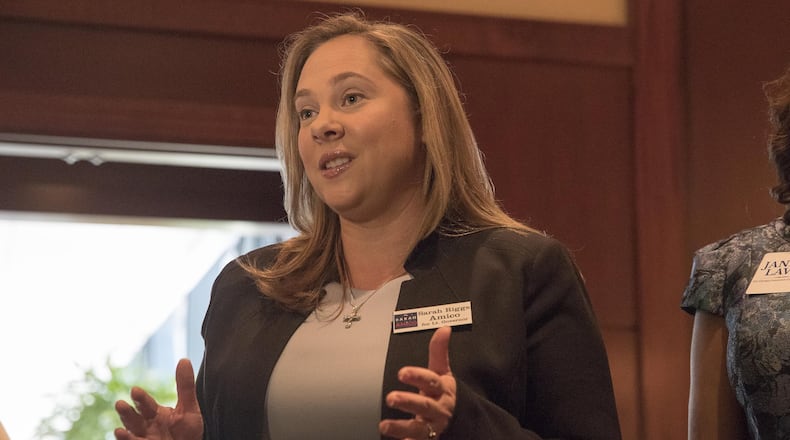Current and former employees of the truck-hauling business headed by the Democratic nominee for lieutenant governor are suing the company and a supervisor, alleging an environment of racial hostility.
Ten employees, all but one of them black, filed a lawsuit in April against yard supervisor Kevin Tumbleson, Auto Handling Corp. and Jack Cooper Transport Co. The Democratic nominee, Sarah Riggs Amico, is the executive chairwoman of Jack Cooper and touts her business experience in her campaign.
In the lawsuit, 10 current and former employees working at a company location in Indiana allege that Tumbleson and other supervisors and employees discriminated against black employees and promoted white employees more quickly. One plaintiff initially in the lawsuit removed herself from the suit last month.
Jack Cooper has more than 50 locations across the Midwest and East Coast and about 3,500 employees.
In a response to the lawsuit filed in U.S. District Court in Indiana, lawyers for Jack Cooper and Tumbleson deny all allegations of discrimination. Tumbleson is still employed with Jack Cooper. The company’s lawyers are calling on the judge to dismiss the case.
“This is a frivolous lawsuit … of course (Tumbleson) is still employed,” said Jack Cooper CEO Mike Riggs, the candidate’s father. “He’s never had even a complaint before. Never been found guilty of anything. Never had any criminal record. He’s a good guy. He didn’t do a damn thing wrong.”
Riggs said the lawsuit is rooted in the dismissal of Jarren Austin, who was fired after the company determined he had sexually harassed and then threatened a female co-worker. Riggs said he believes Austin, who was later reinstated, pooled support from other employees to file the lawsuit.
Rachel Guin, a lawyer representing the employees, denies Riggs’ claims about Austin — who is the lead plaintiff in the case.
“We assert that there are several unbiased witnesses, some Caucasian, who have supported (Austin’s) claims and confirm Tumbleson’s behavior,” she said. “I have no desire to litigate this case in the media. It is unfortunate that Jack Cooper feels otherwise.”
Jack Cooper manages an auto yard in Fort Wayne, Ind., where vehicles are loaded onto trucks to be transported across the country. Amico has been the company board’s chairwoman since 2014 and began serving on the board in 2011.
Riggs, the CEO, said one of Austin’s female co-workers accused him of sexually harassing her and the company suspended him while it investigated.
While Austin was suspended, Riggs said Austin’s brother and a longtime friend were caught on camera writing threatening notes including “snitch” and “dead” on the woman’s time card. Riggs said the company then fired all three employees.
“Whenever you terminate someone who is a union Teamster employee, it is not easy,” Riggs said. “That shows we had enough evidence to prove they threatened this accuser while an investigation was going on.”
During an Atlanta Press Club lieutenant governor debate filmed Tuesday, Amico's opponent hinted at the suit, asking her about policies in place at Jack Cooper for accusations of sexual harassment and racial discrimination, and what she would do if she learned an employee had participated in those activities.
“I’m very proud of our record to create strong anti-harassment and anti-discrimination policies,” she said. “We have instituted things like a 24/7 hotline for employees. And every week I hold a staff meeting with our CEO and his direct reports — the heads of all our business units — so as issues are escalated, they come up to me in that weekly meeting and we’re making sure we take strong and appropriate action.”
Republican nominee Geoff Duncan asked, if those are the policies, why Tumbleson is still employed. During the debate, Amico said she wasn’t familiar with each of her 3,500 employees by name and asked Duncan to clarify. Duncan declined.
“I think we’ll be talking a lot about that the next few days,” he said.
On Wednesday, Riggs, the CEO, said the company is facing the lawsuit because of its policies and efforts to protect the female employees.
“This guy was one of the violators of the policy,” he said of Austin.
Duncan’s campaign said it was surprising that Amico couldn’t readily speak about the charges against Tumbleson.
“Mrs. Amico has based her campaign on her leadership of this company,” Duncan spokesman Dan McLagan said. “Employing an openly racist and sexist supervisor long after being sued over his behavior means she was either an incompetent leader, overstated her role, or she just didn’t care, none of which are acceptable.”
Austin said in the lawsuit that the allegations of sexual harassment were in retaliation to his complaints of racial discrimination.
Lawyers for Tumbleson denied targeting Austin and said an investigation led to Austin’s suspension and then termination. A labor arbitration hearing later reversed Austin’s firing and allowed him to get his job back with Jack Cooper.
Riggs said the woman who accused Austin stopped going to work and has “essentially quit.”
According to the lawsuit, the employees allege that Jack Cooper was known to move white employees from on-call status to full-time status more quickly than black employees who had similar experience and time with the company.
Longtime employees say in the suit that racial discrimination existed at Jack Cooper before Tumbleson was hired but got worse after he joined the company in 2016.
Those suing the company accuse Tumbleson of making statements alluding to all black people either being drug dealers or being on drugs themselves.
The current and former employees in the suit say they told Tumbleson about racist statements made by colleagues — including one accused of calling a co-worker a racial epithet, to which he replied: “What do you want me to do? … I can’t make (them) apologize to you.”
Lawyers for Tumbleson said the supervisor investigated the incident where an employee is accused of using a racial slur against black colleagues, but they did not say whether that employee was disciplined. In another incident, Tumbleson’s lawyers said he disciplined an employee who made off-color jokes and that the employee apologized for being insensitive.
The lawsuit alleges that when employees complained, they often were retaliated against by either being called in for fewer shifts, held in temporary on-call positions longer than other co-workers who were white, or fired.
Riggs said four of the 10 employees suing the company, including Austin, have previously filed complaints with the Equal Employment Opportunity Commission. The EEOC dismissed the claims, according to documents from the federal agency.
“Jack Cooper fully expects to prevail in this case,” Riggs said.
OUR REPORTING
The Atlanta Journal-Constitution is covering the issues and candidates up and down the ballot in a busy election year. Look for more at ajc.com/politics as the state heads for the general election on Nov. 6.
About the Author
Keep Reading
The Latest
Featured




